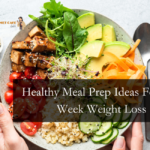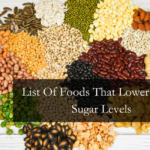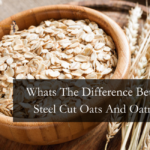The optimal diet for managing menopausal weight gain emphasizes nutrient-dense foods in a balanced manner. Changes in hormone levels can affect the metabolism and adipose distribution during menopause. Important roles are played by portion control, hydration, and tension management. However, this article will discuss best diet for menopausal weight gain.
Best Diet For Menopausal Weight Gain
1. Balanced Macronutrients
A balanced diet comprises the proper quantities of carbs, proteins, and lipids. Complex carbs, found in meals like whole grains, legumes, and vegetables, give sustained energy and help keep blood sugar levels constant.
Protein is required for muscle maintenance and repair, whereas healthy fats promote hormone synthesis and satiety. In your meals, aim for a well-balanced mix of these macronutrients.
2. Portion Control
When a woman goes through menopause, her metabolism and hunger often change. You can control how much you eat and keep from eating too much if you use smaller plates and bowls.
When you eat mindfully, you pay attention to and enjoy every bite. This can also help you notice when your body is telling you it’s hungry or full.
3. Lean Protein
Focus on leaner meats and proteins in the protein department to keep your menopause symptoms at bay. In addition to aiding in weight management, this modification increases bone density and muscle mass.
To incorporate lean protein into your diet:
- Grilled poultry
- Tuna
- The Turkey
- Lean ground beef
- Tofu
- Vegetable lentils
- Beans
- You can occasionally consume red meat, but we must watch our lipid intake.
4. Whole Grains
Whole grains have an excessive amount of fiber, which makes you feel full and helps keep your blood sugar level. Instead of processed carbs like white rice and white bread, eat brown rice, quinoa, whole wheat bread, and oatmeal.
5. Fruits And Vegetables
Fruits and veggies have few calories and are full of important vitamins, minerals, fiber, and antioxidants. These foods can help you feel full and satisfied, and they are also good for your health in many ways. Eat a number of fruits and veggies with different colors every day.
6. Healthy Fats
Healthy fats, especially those in nuts, avocados, and olive oil, are important for making hormones and staying healthy in general.
Even though fats are high in calories, they can help you feel full and satisfied after a meal. When eaten in moderation, these fats can help you control your diet.
7. Limit Added Sugars
The added sugars in sugary beverages, chocolates, and desserts can contribute to weight gain and metabolic disturbances. Reduce consumption of these sugary delights and replace them with naturally sweet foods like fresh fruits.
8. Hydration
Staying hydrated is critical for general health and hunger control. Your body may occasionally confuse thirst for hunger, leading in unnecessary snacking. Staying hydrated can help prevent this confusion and aid with weight management.
9. Vitamin D
Even if your diet is rich in calcium, you should still take a daily vitamin D supplement. Vitamin D is an absolute necessity for calcium absorption. “Both are necessary to enhance the structure of the bone.”
You may need a supplement even though many of us do not get enough of this essential vitamin from solar exposure. This varies from individual to individual, so be sure to ask your healthcare provider if you should have your levels examined.
10. Probiotics
A healthy gut is increasingly recognized as a critical factor in overall health and weight management. Yogurt, kefir, and sauerkraut are probiotic-rich foods promoting a balanced intestinal microbiome, which may benefit metabolism and weight regulation.
11. Manage Stress
It’s important to learn how to deal with stress because long-term worry can cause upset eating and weight gain. Meditation and deep breathing techniques have the potential to assist you deal with stress and improve your health as a whole.
12. Regular Exercise
During menopause, it’s important to combine a healthy diet with regular physical exercise to keep your weight in check. Strength-training exercises can help you keep your muscle mass, which can get smaller as you get older.
Aerobic exercises like walking, riding, and swimming can help you burn calories and get in better shape overall.
13. Consult A Healthcare Professional
If weight gain is a major concern during menopause, speak with your doctor or a certified dietician. They can provide you personalized advise based on your specific needs and may recommend hormone therapy or other treatments if necessary.
14. Calcium Tablets
You do not need dairy products to meet your daily calcium requirements. Especially if you are lactose intolerant, sensitive to dairy, or vegan, reaching for yogurt every morning may not be an option. Fortunately, over-the-counter calcium supplements are effective. Ensure that you are not consuming excessive calcium supplements. Also, divide the dose, as your gut can assimilate no more than 500 milligrams of calcium at once.
15. Wild Yam
If you’ve been looking for natural remedies to alleviate menopause symptoms, you’ve probably heard of wild yam. A brief search will reveal an abundance of extracts and tinctures, but research indicates that wild yam extract, while safe, has little effect on menopause symptoms.
This may be because the popular tuber vegetable associated with Thanksgiving contains a substance called diosgenin, which may have beneficial effects on estrogen in the body. You can still try it, but remember that we are still studying the pros and cons of supplements like this one.
Foods To Avoid
When going through menopause, what you delete can be just as important as what you add. First and foremost, pay attention to your body. If you discover that specific foods worsen your symptoms, try avoiding (or substituting) them to see if this helps. However, there are a few common compounds that you should avoid.
The following substances should be avoided:
1. Spicy Cuisine
Particularly if you are experiencing hot flashes and night sweats, you should reduce your intake of spicy sauce. Unsurprisingly, piquant foods can raise your body temperature and induce or exacerbate these symptoms.
Avoid spicy foods such as cayenne pepper, hot salsa, and jalapeno peppers to keep your body as calm as a cucumber. Try herbs such as thyme or basil if you still want to add a punch of flavor to your dishes.
2. Caffeine And alcohol
Caffeine, as much as you adore your daily cup of joe, may be to fault for your menopausal hot flashes. While this does not mean you should avoid caffeine entirely, it has been established that excessive caffeine consumption makes heat waves worse.
Likewise, for alcohol. If you are experiencing intense hot flashes, night sweats, difficulty sleeping, or rising weight, try giving up your evening glass of wine to see if your symptoms improve.
3. Carbohydrates And Starches
Pasta may be your comfort food, but during menopause, your body may metabolize carbohydrates differently. As your metabolism declines, some people may experience accelerated weight gain. Certain foods may be responsible for some of your excess weight.
“There is no silver bullet,” but starchy carbs tend to be the biggest offender.” It is more difficult for the body to metabolize these foods during menopause because it converts them to sugar.
If menopause is causing unwanted weight gain, consider reducing foods such as:
- Pasta.
- White bread.
- Potatoes.
- Rice.
The same can be said for processed foods and additional carbs. If your body has always had trouble absorbing these foods, menopause will make it more difficult still.
Thanks for reading.










